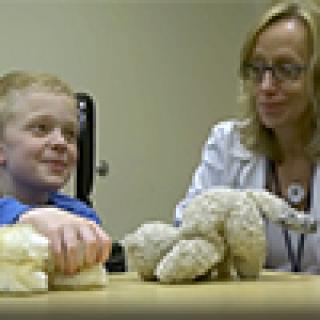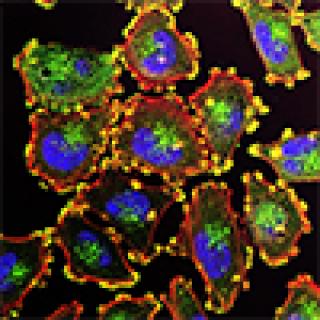News and Events
Celebrating CCR Careers: Steven Z. Pavletic, M.D., Ph.D.
Steven Z. Pavletic, M.D., Ph.D., is a renowned expert in chronic graft-versus-host disease, a serious late complication that can happen after allogeneic bone marrow transplants. After serving at the NCI for over 20 years, he is now announcing his retirement.
Read MoreThe discovery of selumetinib for children with NF1
When Brigitte Widemann, M.D., Chief of the Pediatric Oncology Branch (POB), saw selumetinib shrinking the first child’s tumor, she couldn’t believe her eyes. Then, when she saw the second patient’s tumor shrinking, “I thought, oh my gosh, it’s working!” she recalls. Over 30 years of NCI-led and NCI-supported research culminated in clinical trials of selumetinib for kids with neurofibromatosis type 1 (NF1) and associated tumors called plexiform neurofibromas (PNs). With Food and Drug Administration (FDA) approval, selumetinib is now the first effective treatment for kids with PNs that can't be removed by surgery.
Read MoreFDA approves first therapy for children with neurofibromatosis type 1
The Food and Drug Administration (FDA) has approved selumetinib (Koselugo) to treat children with neurofibromatosis type 1 (NF1) and tumors called plexiform neurofibromas. The approval was based on results from a clinical trial, designed and led by Brigitte Widemann, M.D., Chief of the Pediatric Oncology Branch (POB), and Andrea M. Gross, M.D., Assistant Research Physician in POB, that showed the drug shrank neurofibromas in 70 percent of patients. For many children in the trial, treatment with selumetinib also had clinical benefit, improving their pain, function and quality of life.
Read MoreNew genetic analysis will help researchers understand how diffuse large B-cell lymphoma subtypes respond to experimental therapies
By looking for about 100 potential genetic abnormalities in the DNA of certain lymphomas, researchers can now assign individual cases of DLBCL to one of seven subtypes. The new classification system will better equip researchers to recognize the impact of experimental therapies on subsets of patients whose cancers share key clinical and biological features.
Read MoreMouse models and patient data suggest potential biomarker for immunotherapy response in melanoma
Immune checkpoint inhibitors are an effective treatment for about a third of patients with metastatic melanoma. Now, mouse models and patient data suggest these cancers are more likely to respond to immunotherapy if their cells resemble fully developed melanocytes rather than less mature precursor cells.
Read MoreIn Memoriam: Nancy Colburn, Ph.D.
The Center for Cancer Research mourns the recent death of past colleague and friend Nancy Colburn, Ph.D. She was an esteemed member of the NCI community for 36 years from 1976-2012.
Read MoreCCR researchers show selumetinib shrinks tumors in children with NF1
Findings from a phase 2 clinical trial show that the drug selumetinib improves outcomes for children with the genetic disorder neurofibromatosis type 1 (NF1). In the trial, selumetinib shrank the inoperable tumors that develop with NF1 called plexiform neurofibromas, and children experienced reduced pain, improved function, and better overall quality of life after receiving the treatment. This trial was led by Brigitte Widemann, M.D., Chief of the Pediatric Oncology Branch (POB), and Andrea M. Gross, M.D., Assistant Research Physician in POB, and the results were published March 18, 2020, in the New England Journal of Medicine.
Read MoreNew Milestones publication now available
Every year, the Center for Cancer Research makes remarkable contributions to the understanding, detection, treatment and prevention of cancer. This issue of our annual publication, Milestones, features some of the most impactful science conducted in the past year in CCR. These advances include new insights into how genomes are organized and how DNA and RNA function in cells, how cellular processes and signaling events function in healthy cells and how they are affected in cancer. Other major discoveries this year include how cancers become metastatic and what drives the proliferation of cancer cells.
Read MoreCCR researchers show testing with combined biopsy method improves prostate cancer diagnosis
A method of testing for prostate cancer developed at the Center for Cancer Research leads to more accurate diagnosis and prediction of the course of the disease, according to a new study published in the New England Journal of Medicine. Peter Pinto, M.D., Investigator in the Urologic Oncology Branch, led the study and says this method, which combines systematic biopsy, the current primary diagnostic approach, with MRI-targeted biopsy, is poised to greatly improve prostate cancer diagnosis, thereby reducing the risk of both overtreatment and undertreatment of the disease. To see all open prostate cancer trials, click here.
Read MoreChristian Hinrichs and Steve Rosenberg receive Federal Laboratory Consortium award
Christian Hinrichs, M.D., Investigator in the Experimental Transplantation and Immunotherapy Branch, and Steve Rosenberg, M.D., Ph.D., Chief of the Surgery Branch, received an award from the Federal Laboratory Consortium for Technology Transfer (FLC) for their project, “New, First-in-class Immunotherapy for Treatment of Recurrent, Metastatic Cervical Cancer.” This award recognizes employees of FLC member laboratories and non-laboratory staff who have accomplished outstanding work in the process of transferring federally developed technology.
Read MoreA new set of genes linked to metastasis in melanoma
CCR researchers have found that melanoma can reactivate gene expression patterns that are usually active in melanoblasts, facilitating their progression to metastatic behavior. These newly discovered melanoblast genes have the potential to provide a new source of pathways that could be tapped to develop new treatments for melanoma.
Read More









